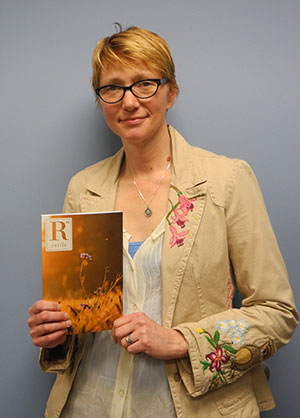Get your work published
Local poet tells students how to connect with literary journals

Reese started publishing in literary journals almost 20 years ago.
March 5, 2015
Publishing literary material can be an intimidating feat. Deadlines, rejections, and the general unknown can discourage aspiring authors from putting themselves out there. However, for those courageous enough, journals, contests and anthologies exist to exhibit and recognize great writing. Madison poet, Rita Mae Reese, made a visit to Madison College on Feb. 26 to talk to students about getting their work out of laptops and notebooks and into the community.
Reese started publishing in literary journals almost 20 years ago. Since then, she’s been gathering experiences she is happy to share. Reese talked to a small group of wordsmiths about how to improve their writing and get exposure. Submitting work to literary journals is one way to gain exposure.
The 9th Letter is a creative non-fiction publication and the New England Review, a broad-spectrum publication which accepts short stories, poems, and fiction across multiple genres. The Pushcart Prize is an anthology of award winning literature that showcases other prize winning literary journals and submissions. Reese recommended The Pushcart Prize to get ideas on where to submit. “It’s a marketplace for all of your work.” Reese said.
Sending stories for submission and potential printing allows for additional and better editing. According to Reese, not only will more people read submitted work and give feedback, but time away from a piece between edits allows for “fresh eyes” that can help catch errors missed on the first round.
Reese said that discordances become more obvious in that time away. This editing tip applies to many kinds of writing. Papers, essays, and projects can all be bettered by giving them some space for a few days and returning after you’ve kind of forgotten what you’ve written about. Being less attached makes it easier to see mistakes.
Reese also recommended patience and resilience while submitting. Just because one publication rejected your piece, doesn’t mean another won’t love it. Sometimes, as in Reese’s case, journals will hold poems they are on the fence about until the next year’s deadline rolls around. However, “If a publication has rejected a specific work, don’t send the same one,” Reese said. The website thereviewreview.net is a great tool to check out different journals for submission. It includes reviews of journals, calls for submission, tips and more information for writers on improving their skills and getting published.
Reese also reminded students to use the resources available to them on campus. “The library will order any book that you want,” she said. To learn more about Rita Mae Reese or to read her poetry, visit ritamaereese.com.
The Yahara Journal is Madison College’s own literary arts publication. Printed once a year, the journal showcases student work in fiction, prose, and art. They are currently holding a writing contest and offering a $50 prize for submissions. The winner will be included in the journal.
Submissions are due by March 13. See madisoncollege.edu/yahara-journal-submission for more information.






























